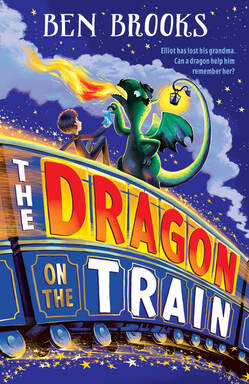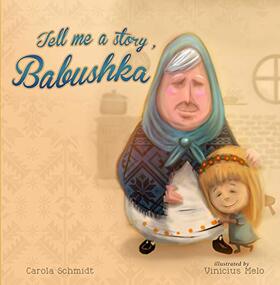 Gone. It was a word that made sense and made no sense at all. How was he supposed to concentrate at school and make sense of anything when his grandma had just . . . well, gone. Not only had grandma been Elliot's connection to his love of music, but she was his best friend too. Now the last thing he wanted to do was play his violin. Music just didn't feel the same without her there. One afternoon his mum knocked on the bedroom door and handed him an old cassette tape in an envelope that grandma had left just for him. As it played, the loop of four simple notes seemed to be asking him questions and demanding answers that he wasn't ready to give. Finally he let his grief explode and when he was done, he fell into a deep, dreamless sleep. But just before midnight, he was awoken by a snuffling sound and when he opened his eyes, it wasn't what he thought it might be. Sitting beside his bed, eating the dinner his mum had left for him was - a dragon! 'I'm your guide for the journey . . .' said Kimorin the dragon. '. . . I'm not going anywhere,' protested Elliot. 'Are you sure? So you ain't got a ticket?' Elliot remembered the ticket he had found under his pillow sixteen days after grandma had died. The only thing on it that he had recognised was his name - and now the dragon's. Elliot's journey on The Night Train was about to begin. From the very first chapter we feel the enormity of Elliot's loss, and sense the love and connection he shared with his grandmother through music. But whilst acknowledging that grief and sadness, Ben Brooks also encourages the reader to embrace the magic of the journey, the importance of friendship and family, and the power of music to heal and inspire hope. A warmhearted and uplifting story for ages 7 +. Highly recommended. Teaching themes could include grief, loss, dragons, trains, family, friendship, magic, magical creatures, boys, emotions, music, composing, musical compositions. Find out more about Ben Brooks Published by Hachette Australia Release date 23 June, 2023 ISBN: 9781786541901 Highly recommended for ages 7 +
0 Comments
 ‘Tell me a story Babushka,’ asks Karina ‘Maybe one of those stories about a princess and monsters, Baba’. The story opens with young girl asking for a story from her Babushka (grandmother). Babushka begins the tale of a young girl happily tending her flowers and cabbage patch until the day she finds herself and her family caught up in Holodomor, the ‘terror famine’. Mass starvation and confiscation of food and property across the country is happening at the hands of the monsters - Baba’s term for the soldiers. Many families, including that of the young girl, are sent to camps in Siberia. Upon arrival, the children and adults are separated, with neither knowing what will happen or if they will ever see each other again. Whilst in the camp, the girl finds a matryoshka (a small set of wooden dolls of decreasing size placed one inside the other) under her mattress. She wonders how they came to be there when there are not even any pillows for the children to sleep on, and certainly no toys. She carefully removes one doll after another until, inside the fifth matryoshka, she finds a message of rescue. As she and some of the other children make their escape with the help of an unknown woman across a frozen forest to a waiting freight train, the girl wraps her scarf around her head, picks up the length of her oversized skirt, and boards the train not knowing where the journey will take her. As the story concludes, we find out that Babushka was the young girl, and that she eventually found her way to safety and freedom in another land, where she is recounting the story to her granddaughter, Karina. The Holodomor was the result of Stalin’s decision to collectivize farms and agriculture in the Soviet Union in 1929. Farms, villages, and whole towns in Ukraine were placed on blacklists and prevented from receiving food causing widespread suffering from 1932-1933. Carola tells the story through simple, gentle and honest text. The strong bond between grandmother and granddaughter is evident from the opening page, emphasizing the importance of generational connections in keeping history alive. Melo’s illustrations are childlike yet evocative, especially the likeness of Babushka to the matryoshka dolls, and the black silhouettes of the soldiers against a blood red background - a stark representation of the cruelty endured by the Ukrainian people. Stories of war and oppression are never easy to tell, especially to younger children. Tell Me A Story Babushka does so with heart and sensitivity. I have not read or heard of many books that tell the story of the Holodomor, so this would make a wonderful addition to any library looking to add more stories from the Ukraine and diversify their collections. Published in 2019 by Carola Schmidt. Available from Amazon in Kindle and Paperback formats ISBN 9788592062729 Recommended for ages 5 - 7 |
Archives
May 2024
|
|
The Book Tree. © Kerry Gittins 2024. All Rights Reserved. |
Visitors
|
|
|

 RSS Feed
RSS Feed